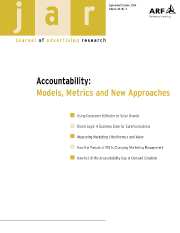No CrossRef data available.
Article contents
Increasing Quality in Measuring Advertising Effectiveness: A Meta-Analysis of Question Framing in Conversion Studies
Published online by Cambridge University Press: 01 July 2003
Abstract
We describe a meta-analysis of advertising conversion research findings that includes examining the influence of question framing on key output measures of advertising effectiveness. The article summarizes findings for 32 tourism-advertising studies. Two hypotheses are tested: (H1) the response rate to questionnaires mailed to sampled advertisement inquirers is lower when the brand sponsoring the study is identified versus not identified; and (H2) the estimated buyer/inquirer conversion rate is higher when the brand sponsoring the study is identified versus not identified. The findings support H1 and strongly support H2. Conclusion: framing a study and questions to persons sampled by referencing these persons' prior known requests for information about a given brand is likely to reduce interest in responding among nonbuyers of the stated brand and bloat estimates of inquiry-to-purchase conversions for the brand. To confirm and estimate the size of such distortions, we recommend designing-in context manipulations in planning surveys to measure the effectiveness of inquiry-generating advertisements.The very helpful comments by Art Kover and JAR reviewers on an earlier version of this report are acknowledged with appreciation.
- Type
- MEASUREMENT
- Information
- Copyright
- © Copyright © 1960-2003, The ARF




